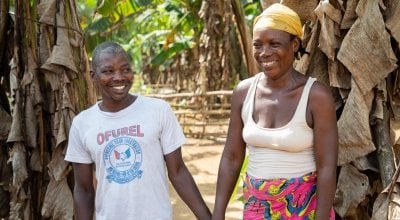
Knowledge Hub
Gender inequality must be addressed for our work to make a lasting difference

Our Executive Director, Danny Harvey, explains why addressing gender inequality is vital in tackling extreme poverty and reveals why 2020 is a pivotal year for advancing gender equality worldwide.
I started working in international development over 20 years ago. Very enthusiastic, I believed my knowledge and skills in agriculture would bring about real transformation for some of the most vulnerable communities in the world. I thought my approach to involve participants in developing their own solutions would translate into sustainable increases in agriculture production and improvements in managing natural resources. But I swiftly realised there were much larger issues at play than the quality of soil and type of seed planted.
Women seemed to be doing most of the work - producing food and protecting forests as they farmed and collected fuel and fruit. Often though, they were not the ones who owned the land; in many places, they were not the ones who went to market to sell surplus produce or buy seed and fertiliser; and they were not the ones who decided what to grow. The agriculture training and practices that Concern supported seemed to be more suited to men rather than women.
A change in programme design
Addressing gender inequality became a growing part of what I did, until it finally became the focus of my work when I provided technical support to promote the empowerment of women and address gender inequality across Concern. Fortunately, there is now an explicit understanding that all of Concern’s development and humanitarian efforts are only effective if we understand the implications of the power differences between men and women, their proscribed roles in society and the risks and vulnerabilities of each.
Concern now designs our programmes around a concept of extreme poverty in which gender inequality must be addressed for our work to make a lasting difference. From providing access to clean water, to developing sustainable livelihoods, or ensuring displaced children have access to education, gender is at the core. We have moved on from simply analysing the roles and responsibilities of men and women, to working with communities and institutions to transform gender relations. When we do our work well, we see whole communities thrive, with women and adolescent girls taking a lead role – running their own farms and businesses, educating others on nutrition and hygiene, and making decisions in local councils.





Strengthening our approach and achieving lasting change
Concern has partnered with Sonke Gender Justice in South Africa to strengthen our approach, and that has involved experiential and challenging training for us, Concern members of staff, so that we fully understand gender from our own perspectives and can commit to tackling inequalities. We have programmes working directly with women and girls to improve their knowledge, develop their businesses and communities and address issues important to them, such as menstrual hygiene or violence in the home. We have also learnt that engaging the ‘power holders’ is critical if we are to achieve a lasting change, so we engage with men directly and encourage them to get involved in family nutrition and domestic life. The approach we have developed, Engaging Men and Women in Gender Equality, will be rolled out in almost all our country programmes. We also work with whole communities, local organisations and government departments to promote the importance of women, and their opinions and efforts in local development, to create space for them to influence and be heard.
Still a long way to go
We still have a long way to go. Gender inequality is pervasive in all our societies and limits opportunities to escape from extreme poverty. When you are female you are more likely to be poor, more likely to be hungry and malnourished, more likely to be kept from school, more likely to be living with HIV and more likely to have experienced some form of violence. In the fragile contexts where Concern works, women are more vulnerable to violence and exploitation, yet they remain responsible for the well-being of the family and provision of food.
2020 is a pivotal year for advancing gender equality worldwide, as the global community takes stock of the progress made for women’s rights a quarter of a century after the adoption of the UN Beijing Platform for Action. For International Women’s Day, it is timely to commit to this year’s theme, I am Generation Equality: Realising Women’s Rights, and redouble our efforts to tackle gender inequality and empower women, and to keep educating and challenging ourselves so we can do this better.
Follow us on Twitter for more updates on our work
Other ways to help
Donate now
Give a one-off, or a monthly, donation today.
Join an event
From mountain trekking to marathon running, join us for one of our many exciting outdoor events!
Buy a gift
With an extensive range of alternative gifts, we have something to suit everybody.
Leave a gift in your will
Leave the world a better place with a life-changing legacy.
Become a corporate supporter
We partner with a range of organisations that share our passion and the results have been fantastic.
Create your own fundraising event
Raise money for Concern by organising your own charity fundraising event.





